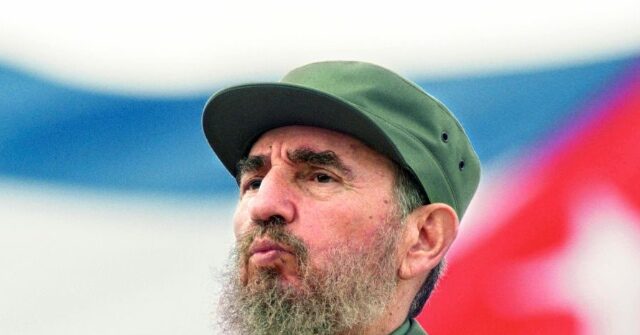Héctor Alejandro Hernández Morales, a senior Cuban regime official identified as the once bodyguard and “trusted man” of both late communist dictator Fidel Castro and his brother and successor Raúl Castro, is presently living in Florida aspiring to obtain U.S. resident status, Cuba-focused outlets reported.
Hernández Morales, 46, was identified as a senior Cuban Interior Ministry official living in Boca Raton, Florida, after entering the United States in August 2024 using a visitor’s visa. The information was first reported by Cuban-American journalist Mario Pentón and then verified by Martí Noticias.
According to the reports, Hernández Morales is hoping to benefit from the 1996 Cuban Adjustment Act (CAA), which allows Cuban nationals to apply for a U.S. green card and become lawful permanent residents after being physically present in the country for at least one year. The CAA is intended to benefit Cubans fleeing from communism and the Castro regime’s brutal persecution.
In addition to serving as a senior interior ministry official, Hernández Morales also reportedly served as a personal bodyguard of both Castro dictators, a position his late father Lázaro Cirilo Hernández also occupied in life. Hernández Morales also served as head of the political police in the municipality of Morón, Ciego de Ávila.
“I honored my father’s legacy by protecting the physical and moral integrity of the country’s top figures,” Hernández Morales was quoted as saying to a Cuban regime-affiliated outlet in 2021. He reminisced about his close relationship to Fidel Castro and the “lessons” he as a child gave to the late dictator, which earned him a spot on the cover of a Cuban communist youth magazine in 1991.
Cuban-American journalist Mario Pentón explained in his report that the rank of lieutenant colonel that Hernández Morales occupied in the Cuban interior ministry is considered a position of “high responsibility, reserved for officers of full confidence of the regime, with authority to direct State Security units and strategic operations.”
Unnamed workers of the northern key of Ciego de Avila confirmed to Pentón that Hernández Morales worked as a state security officer in the northern cay of Ciego de Avila for over a decade. Ciego de Avila is described as a “strategic zone” for the communist regime’s tourist and military interests.
Sources close to the Cuban regime official’s family detailed that Hernández Morales arrived in the U.S. accompanied by one of his daughters while his wife, Yisel Cabrera, and another daughter were already in Florida receiving medical treatment for cancer by the time he arrived. Upon arrival, the family was met by a relative, Rolando Garcia, who denied knowing them when asked by Pentón.
“Attempts to communicate directly with Hernández Morales were unsuccessful: after his departure from Cuba, he deleted his social networks and has avoided any public exposure,” Pentón reported.
“To date, there is no evidence that Hernández Morales has broken with the Cuban regime or expressed regret for his past in the repressive forces, especially after the violent repressions against the popular protests of July 11, 2021. Nor is there any information available about his specific role in those events,” the journalist continued.
Martí Noticias pointed out that Héctor Alejandro Hernández Morales does not appear on the list of over 100 known Cuban repressors living in the United States that Rep. Carlos Giménez (R-FL) presented to Department of Homeland Security Secretary Kristi Noem in late March. Rep. Giménez urged Secretary Noem to “identify, deport, and repatriate” the Cuban regime officials, stressing at the time that they “pose a direct threat to our national security, the integrity of our immigration system, and the safety of Cuban exiles and American citizens alike.”
The list, based on verified information from the nongovernmental organization Foundation for Human Rights in Cuba (FHRC), contains the names and respective ranks within the Cuban communist regime of over 100 known repressors who entered the United States after taking advantage of immigration policies implemented by the administration of former U.S. President Joe Biden. The number represents more than ten percent of FHRC’s entire public list of roughly 1,000 known Castro regime repressors.
Since then, some known repressors have opted to self-deport as a result of public pressure and scrutiny from the Cuban diaspora living in the United States, such as Misael Enamorado Dager, former first secretary of the Cuban Communist Party in Santiago de Cuba and former member of the party’s Central Committee, who returned to Cuba in late March.
Other known Cuban repressors have been arrested by U.S. authorities in past weeks for withholding their links to the Cuban regime. In mid-April, Daniel Morejón García was arrested for failing to disclose his affiliation with the Cuban Communist Party. Morejón García appears on the list that Rep. Giménez presented to Secretary Noem and is accused by FHRC of imprisoning, beating, abusing, and persecuting Cuban dissidents.
Juana Orquídea Acanda Rodríguez, a 62-year-old Cuban judge, was arrested immediately upon her arrival at the Miami International Airport for concealing her links to the Cuban Communist Party.
Tomas Emilio Hernandez Cruz, a 71-year-old former Castro regime intelligence member living in Miami, was arrested in March for fraudulently obtaining a U.S. green card and withholding his links to the Cuban regime.
Christian K. Caruzo is a Venezuelan writer and documents life under socialism. You can follow him on Twitter here.
Read the full article here


